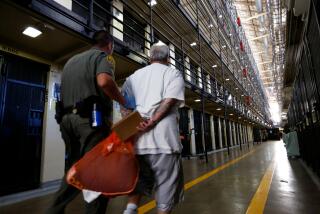Steve Lopez: Jerry Brown a disappointment on prison overcrowding

In 1979, a man with a long history of mental illness robbed an Oakland department store and was sentenced to seven-years-to-life in prison. At the time, the average time behind bars on such a conviction was seven years.
Thirty-two years later, at age 67, this man is still very sick, and still in prison.
I’ve got in a request to visit the man, and I keep thinking about him as I watch the prison population drama play out in Sacramento. Gov. Jerry Brown and Senate leaders have been squabbling over the best way to deal with a court order to cut the ranks of inmates by another several thousand before the end of the year.
Brown wanted to spend more than $1 billion over the next three years to farm them out to county jails that already have their own problems, or send them out of state, in some cases to for-profit prison companies that are already getting rich on California’s huge inmate population.
State Senate President Pro Tem Darrell Steinberg (D-Sacramento) had a much smarter plan. He wanted to ask for a three-year extension on prison reduction and invest in diversion and recidivism reduction for those with drug and mental health problems, groups that make up a large segment of total inmate population.
Today in Sacramento, Brown and Steinberg reached a compromise. If the federal judges allow a three-year extension on population reduction, Steinberg’s plan will be in play. If the judges say no, Brown’s plan is in play.
Regardless of how it turns out, Brown has been a big disappointment on this subject, and California lags behind many other states when it comes to progressive, diversion-focused policy. No doubt some of that has to do with politicians’ fears that if they’re not tough on crime, they’ll be short-timers.
But it costs a fortune to lock up people for crimes that have drug addiction or mental illness as an underlying cause; and meanwhile, rehab programs are underfunded, recidivism is high and taxpayers are stuck with the tab.
Yeah, sure, we need to be tough on crime, but there are plenty of volunteers for that posse.
There’s a critical shortage, though, of politicians interested in being smart on crime.
ALSO:
California officials reach deal to seek compliance with prison order
Man arrested in slaying of woman found under Newport Bay Bridge
Deal to cut prison population faces skepticism from inmates’ lawyers
More to Read
Start your day right
Sign up for Essential California for news, features and recommendations from the L.A. Times and beyond in your inbox six days a week.
You may occasionally receive promotional content from the Los Angeles Times.







